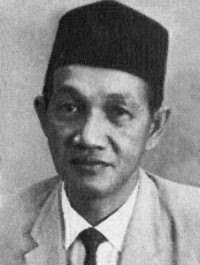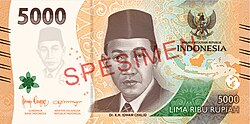Idham Chalid: Difference between revisions
m Removing from Category:Indonesian Muslims using Cat-a-lot |
No edit summary |
||
| Line 4: | Line 4: | ||
|name = Idham Chalid |
|name = Idham Chalid |
||
|image = Idham Chalid.jpg |
|image = Idham Chalid.jpg |
||
| ⚫ | |||
|caption = Idham Chalid in 1960 |
|caption = Idham Chalid in 1960 |
||
| ⚫ | |||
|office = |
|office = List of Speakers of the People's Representative Council{{!}}Speaker of the<br>People's Representative Council]] |
||
|term_start = 28 October 1971 |
|term_start = 28 October 1971 |
||
|term_end = 1 October 1977 |
|term_end = 1 October 1977 |
||
| Line 13: | Line 12: | ||
|deputy = {{Collapsible list |
|deputy = {{Collapsible list |
||
|framestyle=border:none; padding:0; |
|framestyle=border:none; padding:0; |
||
|title= |
|title={{nobold|''See list''}} |
||
|1=Sumiskum (1971–1977) |2=Domo Pranoto (1971–1977) |3=Muhammad Sudjono (1977) |4=[[Jailani Naro]] (1971–1977) |5=Mohammad Isnaeni (1971–1977)}} |
|1=Sumiskum (1971–1977) |2=Domo Pranoto (1971–1977) |3=Muhammad Sudjono (1977) |4=[[Jailani Naro]] (1971–1977) |5=Mohammad Isnaeni (1971–1977)}} |
||
|predecessor = Achmad Sjaichu |
|predecessor = Achmad Sjaichu |
||
|successor = [[Adam Malik]] |
|successor = [[Adam Malik]] |
||
|order1 = 3rd |
|||
| |
|office1 = People's Consultative Assembly#List of speakers{{!}}Speaker of the<br>People's Consultative Assembly |
||
|term_start1 = 28 October 1971 |
|||
|term_end1 = 30 September 1977 |
|||
| ⚫ | |||
| ⚫ | |||
|successor1 = [[Adam Malik]] |
|||
|order2 = 7th |
|||
| ⚫ | |||
| ⚫ | |||
|term_end2 = 1983 |
|||
|president2 = [[Suharto]] |
|president2 = [[Suharto]] |
||
| |
|predecessor2 = [[Wilopo]] |
||
| |
|successor2 = [[Maraden Panggabean]] |
||
|office3 = Ministerial roles |
|||
| ⚫ | |||
| |
|subterm3 = 1956–1959 |
||
| ⚫ | |||
| ⚫ | |||
| ⚫ | |||
| ⚫ | |||
| ⚫ | |||
| |
|subterm5 = 1970–1971 |
||
| ⚫ | |||
| ⚫ | |||
| ⚫ | |||
|predecessor3 = [[Wilopo]] |
|||
| |
|subterm6 = 1971–1973 |
||
| ⚫ | |||
| |
|subterm7 = 1973–1982 |
||
| ⚫ | |||
| subterm4 = 1956–1959 |
|||
| ⚫ | |||
| ⚫ | |||
| ⚫ | |||
| ⚫ | |||
| ⚫ | |||
| ⚫ | |||
| ⚫ | |||
| subterm6 = 1970–1971 |
|||
| ⚫ | |||
| ⚫ | |||
| ⚫ | |||
| subterm7 = 1971–1973 |
|||
| ⚫ | |||
| subterm8 = 1973–1982 |
|||
| ⚫ | |||
| ⚫ | |||
| ⚫ | |||
| ⚫ | |||
| ⚫ | |||
| ⚫ | |||
|spouse = Mastura |
|spouse = Mastura |
||
|children = |
|children = |
||
Revision as of 16:18, 13 February 2024
Idham Chalid | |
|---|---|
 Idham Chalid in 1960 | |
| 6th Speaker of the People's Representative Council]] | |
| In office 28 October 1971 – 1 October 1977 | |
| President | Suharto |
| Deputy | See list
|
| Preceded by | Achmad Sjaichu |
| Succeeded by | Adam Malik |
| 3rd Speaker of the People's Consultative Assembly | |
| In office 28 October 1971 – 30 September 1977 | |
| President | Suharto |
| Preceded by | Abdul Haris Nasution |
| Succeeded by | Adam Malik |
| 7th Chairman of the Supreme Advisory Council | |
| In office 1978–1983 | |
| President | Suharto |
| Preceded by | Wilopo |
| Succeeded by | Maraden Panggabean |
| Ministerial roles | |
| 1956–1959 | Deputy Prime Minister |
| 1968–1971 | Coordinating Minister of People's Welfare |
| 1970–1971 | Acting Minister of Social Affairs |
| Faction represented in People's Representative Council | |
| 1971–1973 | Groups of Nahdlatul Ulama |
| 1973–1982 | United Development Party |
| Personal details | |
| Born | 27 August 1921 Satui, Onderafdeeling Tanah Laoet, Dutch East Indies |
| Died | 11 July 2010 (aged 88) Jakarta, Indonesia |
| Political party | |
| Spouse | Mastura |
Idham Chalid (27 August 1921 – 11 July 2010) was an Indonesian politician, religious leader, and minister, who served as Chairman of the People's Consultative Assembly and Chairman of the People's Representative Council from 1972 until 1977. He was also a prominent leader of the Nahdlatul Ulama (NU) and leader of the United Development Party (PPP), from 1956 until 1984.
He was appointed a National Hero of Indonesia, along with 6 other figures, based on Presidential Decree No. 113/TK/Tahun 2011 dated November 7, 2011. On December 19, 2016, he was immortalized in the new redesign of Rp. 5.000, new rupiah banknote.
Early life and education
Early life
Idham Chalid was born on August 27, 1921, in Setui, Tanah Bumbu regency, in the southeast portion of South Kalimantan. He is the eldest of five children. His father was Muhammad Chalid, a person from Amuntai, about 200 kilometers from Banjarmasin. When he was six years old, his family moved to Amuntai and lived in the Tangga Ulin area, his father's ancestral hometown.[1]
Education
He was admitted to the second grade of Amuntai People's School (SR). After graduating from there, he continued his education to Madrasah Ar-Rasyidiyyah in 1922. Idham continued his education at the Gontor Islamic Boarding School located in Ponorogo, East Java. Becoming fluent in a number of languages, including Japanese. After graduating from Gontor, 1943, he continued his education in Jakarta. In the capital, his fluency resulted in him being employed as a translator between the Japanese and the Nahdlatul Ulama (NU).
Around this time, he graduated from an Islamic teaching college, and would go on to work as a teacher at Islamic institutes from 1943-1945.[1]
Political career
Early political career
Following the Proclamation of Independence, he joined the Indonesian People's Union, a local party, which then moved to the Indonesian Muslim Union. After working in local government, in 1950 he became a member of the People's Representative Council. After a short period as secretary general of the Nahdlatul Ulama, in 1956 he became chairman, a position he held until 1984. In March 1956, he was appointed second deputy prime minister in the Second Ali Sastroamidjojo Cabinet, and four years later became deputy chairman of the People's Consultative Assembly.[2][3][4] In 1960, after Masyumi Party was banned by President Sukarno, Idham appointed Zakaria bin Muhammad Amin as an administrator for Nahdlatul Ulama in Bengkalis Regency.[5]
The New Order
Following the fall of President Sukarno, he served in the Ampera Cabinet and Revised Ampera Cabinet as minister of people's welfare from July 1966 until June 1968. He was reappointed to the First Development Cabinet as state minister for people's welfare. From 1972 to 1977, he was both speaker of the People's Representative Council and chairman of the People's Consultative Assembly.[2][3][6]
National Hero

Idham died in Cipete, South Jakarta on 11 July 2010 ten years after suffering a stroke.[7] He was buried in the grounds of the Darul Qur`an Islamic Boarding School complex in Cisarua, Bogor. He was named a National Hero of Indonesia based on 113/TK/Tahun Presidential Decree No. 2011 dated 7 November 2011. He became the third Banjarese to receive the title.[1][8][9]
Following the issuance of Presidential Decree No. 31 of 5 September 2016, Bank Indonesia introduced seven new banknote designs featuring national heroes. Idham Chalid's face is featured on the obverse of the Rp 5,000 banknote.[10] Idham Chalid's face is also featured on the newer 2022 series.
Notes
- ^ a b c "Profil Idham Chalid". tirto.id (in Indonesian). Retrieved 2021-09-25.
- ^ a b Roeder & Mahmud 1980, p. 70.
- ^ a b NU Online 2010a.
- ^ Simanjuntak 2003, pp. 162–163.
- ^ Saputra 2020, p. 150, 156.
- ^ Simanjuntak 2003, pp. 299–325.
- ^ "Mantan Ketua PBNU Meninggal". Liputan6.com. 2010-07-11. Retrieved 2021-09-30.
- ^ NU Online 2010b.
- ^ Mirnawati 2012, pp. 292–293.
- ^ Kuwado 2016.
References
- Feith, Herbert (2008) [1962]. The Decline of Constitutional Democracy in Indonesia. Singapore: Equininox Publishing (Asia) Pte Ltd. ISBN 979-3780-45-2.
- Kuwado, Fabian Januarius (14 September 2016). "Jokowi Teken Keppres Gambar Pahlawan Nasional pada Uang Kertas dan Logam" [Jokowi Signs the Presidential Decision on Pictures of National Heroes on Banknotes and Coins]. Kompas (in Indonesian). Jakarta: Kompas Gramedia Group. Retrieved 5 August 2019.
- Mirnawati (2012). Kumpulan Pahlawan Indonesia Terlengkap [Most Complete Collection of Indonesian Heroes] (in Indonesian). Jakarta: CIF. ISBN 978-979-788-343-0.
- Ricklefs, M.C. (2008) [1981], A History of Modern Indonesia Since c. 1200 (4th ed.), Palgrave MacMillan, ISBN 978-0-230-54686-8
- NU Online (11 July 2010a). "NU calls for prayers for late Idham Chalid". NU Online. Retrieved 4 August 2019.
- NU Online (13 July 2010b). "Obituary: KH Idham Chalid, one of RI's best politician-cum-ulema". NU Online. Retrieved 4 August 2019.
- Roeder, P. N. H.; Mahmud, Mahiddin (1980). Who's Who in Indonesia (2nd ed.). Jakarta: Gunung Agung.
- Simanjuntak, P. N. H. (2003), Kabinet-Kabinet Republik Indonesia: Dari Awal Kemerdekaan Sampai Reformasi (in Indonesian), Jakarta: Djambatan, ISBN 979-428-499-8
- Saputra, Amrizal, Wira Sugiarto, Suyendri, Zulfan Ikhram, Khairil Anwar, M. Karya Mukhsin, Risman Hambali, Khoiri, Marzuli Ridwan Al-bantany, Zuriat Abdillah, Dede Satriani, Wan M. Fariq, Suwarto, Adi Sutrisno, Ahmad Fadhli (2020-10-15). PROFIL ULAMA KARISMATIK DI KABUPATEN BENGKALIS: MENELADANI SOSOK DAN PERJUANGAN (in Indonesian). CV. DOTPLUS Publisher. ISBN 978-623-94659-3-3.
{{cite book}}: CS1 maint: multiple names: authors list (link)
